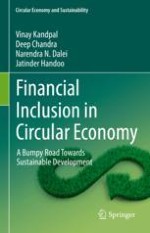2023 | OriginalPaper | Chapter
3. Socio-economic Impact of Financial Inclusion
Authors : Vinay Kandpal, Deep Chandra, Narendra N. Dalei, Jatinder Handoo
Published in: Financial Inclusion in Circular Economy
Publisher: Springer International Publishing
Activate our intelligent search to find suitable subject content or patents.
Select sections of text to find matching patents with Artificial Intelligence. powered by
Select sections of text to find additional relevant content using AI-assisted search. powered by
